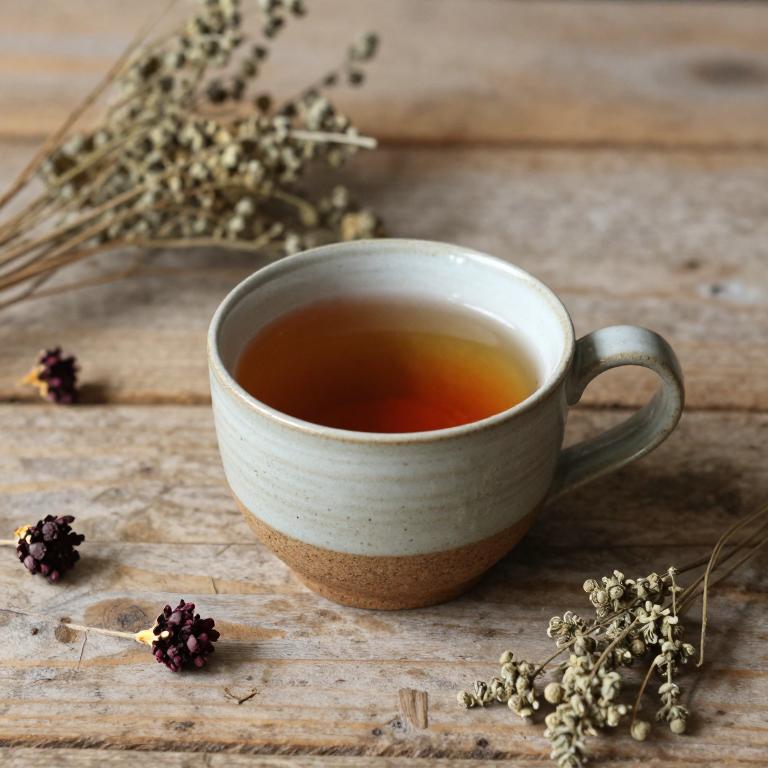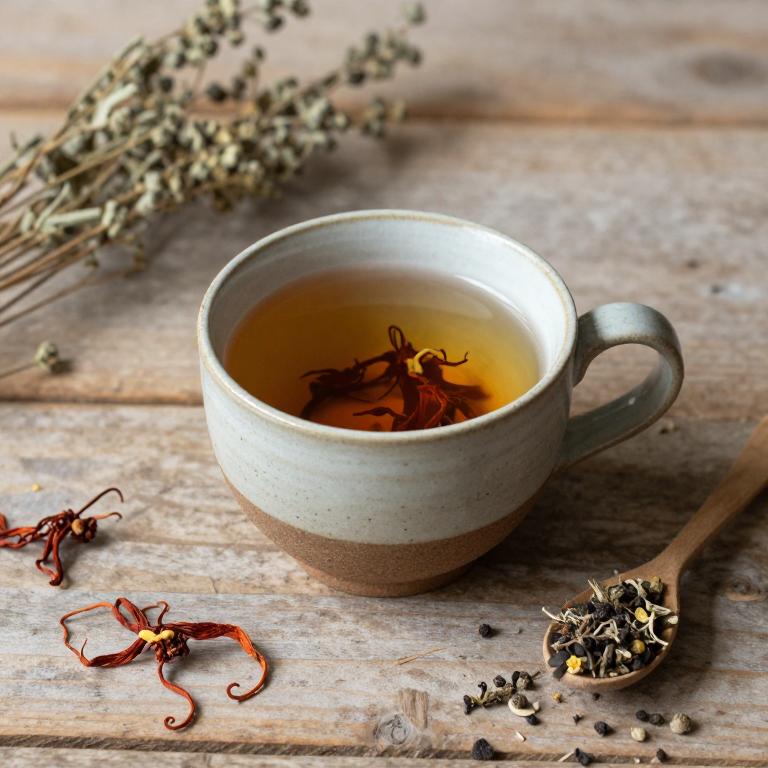10 Best Herbal Teas For Hormonal Imbalance

Herbal teas can be a natural and effective way to support hormonal balance by providing essential nutrients and bioactive compounds that influence the endocrine system.
Herbs such as chaste tree (Vitex agnus-castus), sage, and licorice root are commonly used to regulate estrogen and progesterone levels, particularly in women experiencing menstrual irregularities or menopausal symptoms. Additionally, adaptogenic herbs like ashwagandha and rhodiola rosea help the body manage stress, which is a key factor in hormonal disruptions. Drinking herbal teas regularly can complement conventional treatments and promote overall wellness without the side effects of pharmaceutical interventions.
However, it is important to consult a healthcare professional before incorporating herbal teas into a hormonal health regimen, as some herbs may interact with medications or have contraindications for certain conditions.
Table of Contents
- 1. Chaste tree (Vitex agnus-castus)
- 2. Black cohosh (Cimicifuga racemosa)
- 3. Stinging nettle (Urtica dioica)
- 4. Thistle (Silybum marianum)
- 5. Licorice (Glycyrrhiza glabra)
- 6. Fennel (Foeniculum vulgare)
- 7. Echinacea (Echinacea purpurea)
- 8. Turmeric (Curcuma longa)
- 9. Golden root (Rhodiola rosea)
- 10. Salvia (Salvia officinalis)
1. Chaste tree (Vitex agnus-castus)

Vitex agnus-castus, commonly known as chasteberry, is a popular herbal remedy used to support hormonal balance, particularly in women experiencing menstrual irregularities or symptoms of menopause.
This herb is believed to influence the hypothalamus and pituitary gland, which regulate the production of hormones such as prolactin and luteinizing hormone. Chasteberry tea is often recommended for alleviating symptoms like irregular periods, premenstrual syndrome (PMS), and mood swings. It is typically consumed as a mild, calming infusion that can be enjoyed daily for its potential hormonal benefits.
While generally considered safe, it is advisable to consult a healthcare provider before use, especially for those with existing health conditions or on medication.
2. Black cohosh (Cimicifuga racemosa)

Cimicifuga racemosa, commonly known as black cohosh, is a popular herbal remedy used to support hormonal balance, particularly in women experiencing symptoms of menopause.
It is often consumed as a herbal tea, which can help alleviate common menopausal symptoms such as hot flashes, night sweats, and mood swings. The active compounds in black cohosh, including triterpene glycosides, are believed to interact with the body's hormonal systems, potentially modulating estrogen receptor activity. While generally considered safe for short-term use, it is important to consult a healthcare provider before starting any herbal treatment, especially for those with pre-existing medical conditions or taking other medications.
As with any supplement, the quality and preparation of the herbal tea can significantly impact its effectiveness and safety.
3. Stinging nettle (Urtica dioica)

Urtica dioica, commonly known as stinging nettle, is a herb that has been traditionally used to support hormonal balance due to its rich nutrient profile and bioactive compounds.
Herbal teas made from dried stinging nettle leaves can help regulate estrogen levels and alleviate symptoms associated with hormonal imbalances, such as menstrual irregularities and menopausal discomfort. The high content of minerals like iron, calcium, and magnesium in nettle tea supports overall endocrine function and may help reduce inflammation linked to hormonal disorders. Additionally, nettle tea is often used to support thyroid health, which plays a crucial role in hormone regulation.
When consumed regularly, stinging nettle tea may offer a natural and gentle way to promote hormonal equilibrium, though it is advisable to consult a healthcare professional before use, especially for those with existing medical conditions.
4. Thistle (Silybum marianum)

Silybum marianum, also known as milk thistle, is a herbal remedy that has been traditionally used to support liver health and may play a role in managing hormonal imbalances.
Its active compound, silymarin, is believed to have antioxidant and anti-inflammatory properties that can help detoxify the liver, which is crucial for hormone regulation. Herbal teas made from silybum marianum may assist in balancing estrogen levels and supporting the body's natural detoxification processes. However, it is important to consult with a healthcare professional before using this herb, especially for individuals with existing hormonal conditions or those taking medications.
While some studies suggest potential benefits, more research is needed to fully understand its effects on hormonal health.
5. Licorice (Glycyrrhiza glabra)

Glycyrrhiza glabra, commonly known as licorice root, has been traditionally used in herbal medicine for its potential benefits in balancing hormones.
This herb contains compounds like glycyrrhizin and flavonoids, which may help regulate the body's endocrine system by influencing cortisol levels and adrenal function. Some studies suggest that licorice root can support the management of hormonal imbalances, particularly in conditions like adrenal fatigue and premenstrual syndrome. However, it is important to use licorice root cautiously, as excessive consumption can lead to side effects such as hypertension and electrolyte imbalances.
When used in moderation and under professional guidance, licorice root herbal tea may offer a natural complement to hormonal health.
6. Fennel (Foeniculum vulgare)

Foeniculum vulgare, commonly known as fennel, is a herbal remedy often used in teas to support hormonal balance due to its rich content of phytoestrogens and essential oils.
These compounds may help regulate estrogen levels, making fennel tea a popular choice for women experiencing symptoms of menopause or menstrual irregularities. The tea is also believed to ease digestive issues and reduce bloating, which are commonly associated with hormonal fluctuations. While some studies suggest potential benefits, more research is needed to confirm its efficacy for hormonal imbalances.
As with any herbal remedy, it is advisable to consult a healthcare provider before incorporating fennel tea into a treatment plan.
7. Echinacea (Echinacea purpurea)

Echinacea purpurea, commonly known as purple coneflower, is a popular herbal remedy often used in teas to support immune health.
While primarily recognized for its immune-boosting properties, some studies suggest that echinacea may also have potential benefits for hormonal balance due to its anti-inflammatory and antioxidant properties. These properties may help regulate the body's stress response, which in turn can influence hormone levels such as cortisol and sex hormones. However, more research is needed to fully understand its efficacy in treating hormonal imbalances.
As with any herbal supplement, it is advisable to consult a healthcare professional before incorporating echinacea into a hormonal health regimen.
8. Turmeric (Curcuma longa)

Curcuma longa, commonly known as turmeric, is a popular herbal ingredient used in teas to support hormonal balance due to its anti-inflammatory and antioxidant properties.
The active compound in turmeric, curcumin, has been studied for its potential to modulate hormone levels by influencing pathways related to estrogen and thyroid function. Herbal teas made from turmeric can help alleviate symptoms associated with hormonal imbalances, such as mood swings, fatigue, and irregular menstrual cycles. These teas are often combined with other herbs like ginger or black pepper to enhance absorption and effectiveness.
However, it is important to consult with a healthcare provider before using turmeric teas, especially for individuals with existing hormonal conditions or those taking medications.
9. Golden root (Rhodiola rosea)

Rhodiola rosea, also known as the "golden root," is an adaptogenic herb that has been traditionally used to support hormonal balance and reduce stress-related symptoms.
Its active compounds, such as rosavins and salidrosides, are believed to modulate the body's stress response and regulate the hypothalamic-pituitary-adrenal (HPA) axis, which plays a key role in hormone production. Herbal teas made from rhodiola rosea may help alleviate symptoms of hormonal imbalance, including fatigue, mood swings, and irregular menstrual cycles. However, it is important to consult with a healthcare provider before using rhodiola rosea, especially for individuals with existing medical conditions or those taking medications.
While research suggests potential benefits, more clinical studies are needed to fully understand its efficacy and safety in treating hormonal disorders.
10. Salvia (Salvia officinalis)

Salvia officinalis, commonly known as sage, has been traditionally used in herbal teas to support hormonal balance due to its potential phytoestrogenic properties.
These compounds may help regulate estrogen levels, making sage tea a popular remedy for women experiencing symptoms like irregular menstrual cycles or menopausal discomfort. Additionally, sage contains antioxidants and anti-inflammatory compounds that may support overall hormonal health and reduce stress-related hormonal fluctuations. Herbal teas made from dried sage leaves are often consumed in small amounts to avoid overconsumption, as excessive intake can have adverse effects.
While research on its efficacy for hormonal imbalance is ongoing, many individuals find sage tea to be a calming and supportive addition to their wellness routine.